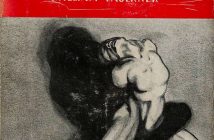Disclaimer: The Edge recognises that the following is an amateur production, however our review seeks to hold Performing Arts to their own high standard of work.
Among several unpleasant sensations which came over me during Breaking was the realisation that I would have no choice but to give it a negative review. I thought, therefore, that it would be best to make it clear from the start, with sincere regret, that that is what this will be.
Breaking is an independent SUSU Theatre Group show written by student Kaustubh Sameer, which ran from March 6th-11th in Building 28 at Highfield Campus. The play focuses on Kai and Ruby Taylor, a husband and wife held in separate enclosures in a P.O.W. camp. The production team clearly went to some pains to create an air of intrigue about the show, creating a more-than-usually-detailed website, promotional videos, and in-universe documents. This feeling of anticipation was carried to the door: the ticket desk was covered with camouflage fabric, foreboding drums sounded over speakers, and images of warfare were projected onto the wall outside.
Inside the seats were arranged in three rows on stage decking. The stage itself was taken up by a cage-like structure with two compartments made entirely of gaffer tape and some sand-coloured material as the floor. So far, so good. But then the play began, and before we had wandered very far into the first scene, a disheartening realisation had come over me. The website, videos, the skilfully engineered hype—they were all window-dressing, attractive enough to make you pause and enter the shop, but powerless to stop you from finding that the goods on offer fall very far short of the advertised standard—the goods in Breaking‘s case being, among others, contrived “theatricality”, unrealistic and fluctuating characterisation, ham-fisted dialogue (in such flavours as, “The very walls in this place make me shiver”, and, “Don’t you fucking die in the process, Kai—I know you and your foolish bloody bravery!”) and a howling void where a plot ought to be.
This must have been pretty hard on the actors, who are surely not to blame—I do not see how it could be possible, for example, to deliver lines such as, “They took my husband. They took my sons. They didn’t even leave me my daughter, bastards!” and, “I had no inclination to cling on”, in any kind of realistic, let alone affecting, way. Indeed, the dialogue oddly drifted between harsh, stilted patois and quasi-Shakespearean verbiage, and the lines given to each character were all written in more or less the same oscillating diction. The only consistent, sure-fire rule was that no subtlety could be preserved and no thought left unsaid—really, there is no such thing as “show, don’t tell” in this play.
I do not wish to drag the actors too far into this and must pause to select a couple for special praise: namely, Samuel Rowley as Jace, who did his best to breathe some life into his prosaic whacky/philosophical/Gollum-esque character, and Emma Paull as Anne, whose performance in several scenes raised those scenes above the level of the rest, and who did an extraordinary job of carrying the audience’s attention through some otherwise hackneyed and humdrum exchanges, especially impressive given that the character as written becomes, for no apparent reason, a completely different person part-way through the play.
It would be useful for the purposes of this review if I could provide a short summary of the plot of Breaking, but I am afraid that I cannot because, despite having watched it attentively and read all its promotional material carefully, I have almost no idea what happens in it, and, apart from a few surface details, I do not recognise the plot description on the Breaking website as a description of what I saw. If there ever was a plot, it was drowned in a thick, cold soup of phony drama, painful dialogue, and inconsistent characterisation. The world of Breaking is a world in which nothing happens at all, and disparate elements mingle and coalesce half-heartedly and then drift apart, this slow and aimless show occasionally receiving a defibrillator shock to the heart in the form of a sudden moment of violence, swearing or loud screaming, which, being tacked on rather than essential to the action, entirely fails to have the desired effect.
Overall, there is little to commend Breaking, except in a few performances and this-and-that element of its publicity, costumes and staging. There are many, many other nonsensical, confusing and inappropriate elements, which, because they would take many more paragraphs to enumerate, I must pass over in stoic silence, and instead offer only this unfortunately appropriate soundbite with which to sum up the play, a soundbite which, however puckish, is nevertheless the truthful and inevitable bottom line: Breaking was bad.
SUSU Theatre Group’s Breaking ran from March 6th–11th.





3 Comments
Hi Jacob. Just a few small things.
When deciding to write a negative review, do you not feel it appropriate to watch the whole play first and not make a judgement based on the first few minutes? According to your ‘review’ you had decided it was bad “before we had wandered very far into the first scene”. Ironically, I decided your review was bad before reading more than a paragraph.
You say you do not see how it is possible to deliver lines such as “I had no inclination to cling on”. Why? Is it maybe because this is your first Theatre Group review and to my understanding you have no experience of theatre? But I guess for you it is clearly not possible to deliver any line, as I distinctly remember you messing one up in the final sketch of Infinite Surrender (great show – would thoroughly recommend).
‘There is no such thing as “show, don’t tell” in this play’. Well Jacob, I’ve got news for you. The entire (silent) last scene with the guard was ‘show’, in fact it was one of the most important scenes in the storyline, but of course you wouldn’t know that.
So instead of using a thesaurus on every other word to sound ‘clever’, perhaps you should spend a little more time paying attention to the play – maybe then you would understand at least the plot.
yeah Jacob learn your lines next time ffs
Jacob Power? More like Jacob [doesn’t have the] Power (to write good reviews)